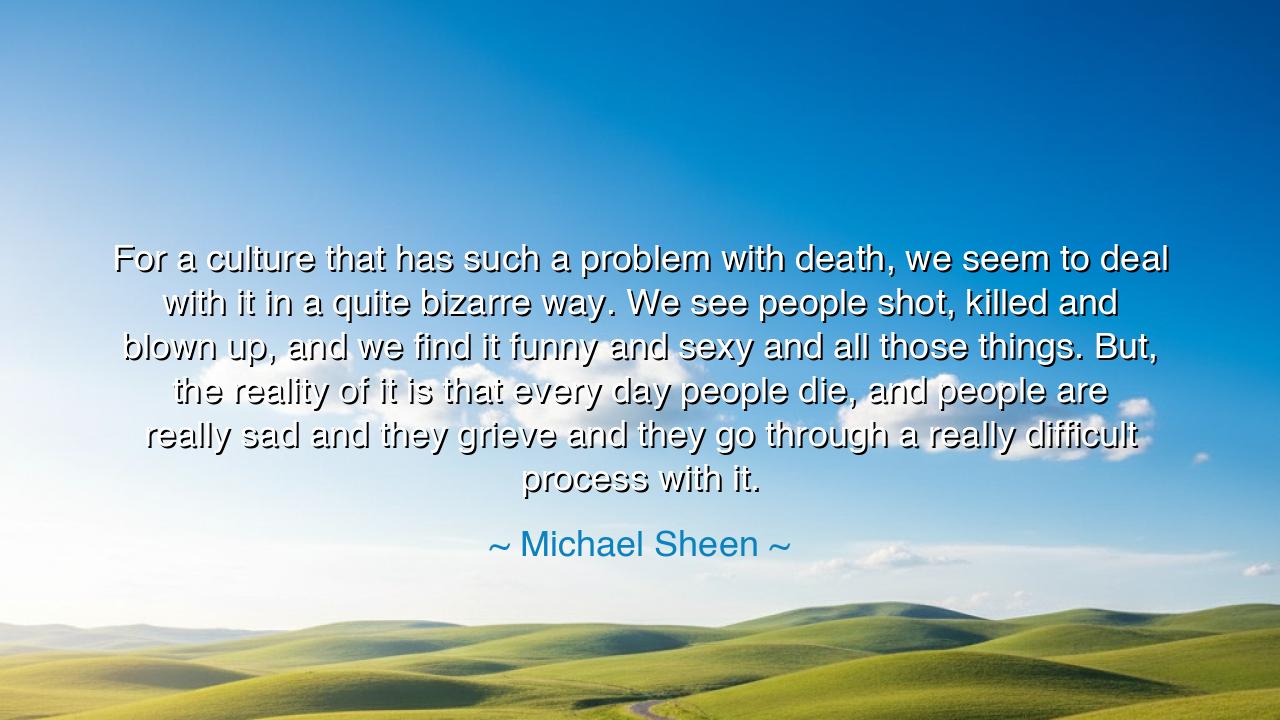
For a culture that has such a problem with death, we seem to deal
For a culture that has such a problem with death, we seem to deal with it in a quite bizarre way. We see people shot, killed and blown up, and we find it funny and sexy and all those things. But, the reality of it is that every day people die, and people are really sad and they grieve and they go through a really difficult process with it.






Michael Sheen once said with gravity and compassion: “For a culture that has such a problem with death, we seem to deal with it in a quite bizarre way. We see people shot, killed and blown up, and we find it funny and sexy and all those things. But, the reality of it is that every day people die, and people are really sad and they grieve and they go through a really difficult process with it.” In these words, he lays bare a contradiction that defines much of the modern spirit — a world that fears death, yet consumes it as spectacle. His reflection is not merely a critique of cinema or media, but a lament for how society has grown numb to the sacredness of life, mistaking violence for entertainment and grief for weakness.
The ancients would have recognized this paradox. They, too, lived among death — on battlefields, in plagues, beneath the fall of empires — yet they met it not with denial, but with reverence. The Stoics taught memento mori — “remember you must die” — not as a morbid phrase, but as a compass for the living. To remember mortality was to live more truthfully, to love more fully, to value every breath. But as Sheen observes, our modern world has buried this wisdom beneath illusion. We worship youth and vitality while hiding the old and the dying; we glorify violence on screen while recoiling from its reality. We have forgotten how to die — and therefore, how to live.
The “bizarre way” Sheen describes is a symptom of a deeper disconnection. In films and games, death has become choreography — a flash of color, a clever line, a cut to black. We watch a thousand deaths, yet feel none. But in the quiet of hospitals, in the solitude of mourning homes, the true face of death is raw and slow and unbearably human. It demands courage, tenderness, and community — things our hurried world no longer knows how to give. What Sheen grieves is not just desensitization, but the loss of empathy: the ability to stand beside another in sorrow without distraction or irony.
History teaches us that every civilization that forgets reverence for death begins to decay from within. The Romans, in their later decadence, turned executions into public entertainment. They had grown so numb to suffering that the sight of blood became leisure. And yet, beneath that spectacle, their society began to crumble — not because of barbarians at the gates, but because their souls had grown hollow. So too, Sheen warns, our culture of entertainment risks the same fate: we drown our fear of mortality in fantasy, until real suffering feels inconvenient, and real compassion feels out of place.
Yet in his sorrow, there is also a call to awakening. For if death terrifies us, it is only because we have stopped seeing it as a teacher. Every ending, whether of a life or a season, is a mirror reminding us of what truly matters. The grief Sheen speaks of — the “really difficult process” of loss — is not something to escape, but to embrace. To grieve deeply is to love deeply; to mourn is to honor the reality that life, however brief, has meaning. In allowing ourselves to feel the pain of loss, we recover the tenderness that makes us human.
There are many stories that embody this truth, but perhaps none more than that of the Japanese samurai, who meditated daily upon their own deaths. They believed that only by confronting mortality could one act with clarity, honor, and peace. Death was not an enemy to fear, but a companion that whispered, “Do not waste this day.” Sheen’s wisdom, though spoken in a modern tongue, carries the same ancient resonance: to face death truthfully is to reclaim one’s soul from apathy.
Thus, the lesson of his words is this — let us stop hiding from mortality, and instead meet it with courage and humility. When we see death on a screen, let us remember the truth behind the fiction. When we encounter grief, let us not turn away, but sit with it, allowing compassion to reshape us. To laugh at death is human, but to understand it is divine. The one who accepts mortality no longer fears it; the one who denies it becomes its prisoner.
So, children of the living world, take heed: do not seek to make death glamorous, nor to make grief disappear. Learn instead to see both as part of life’s great cycle. Honor those who have passed, comfort those who mourn, and live with the awareness that your own time, too, is precious and fleeting. For only when we restore reverence for death will we rediscover the true beauty of life — raw, fragile, and immeasurably sacred.






AAdministratorAdministrator
Welcome, honored guests. Please leave a comment, we will respond soon